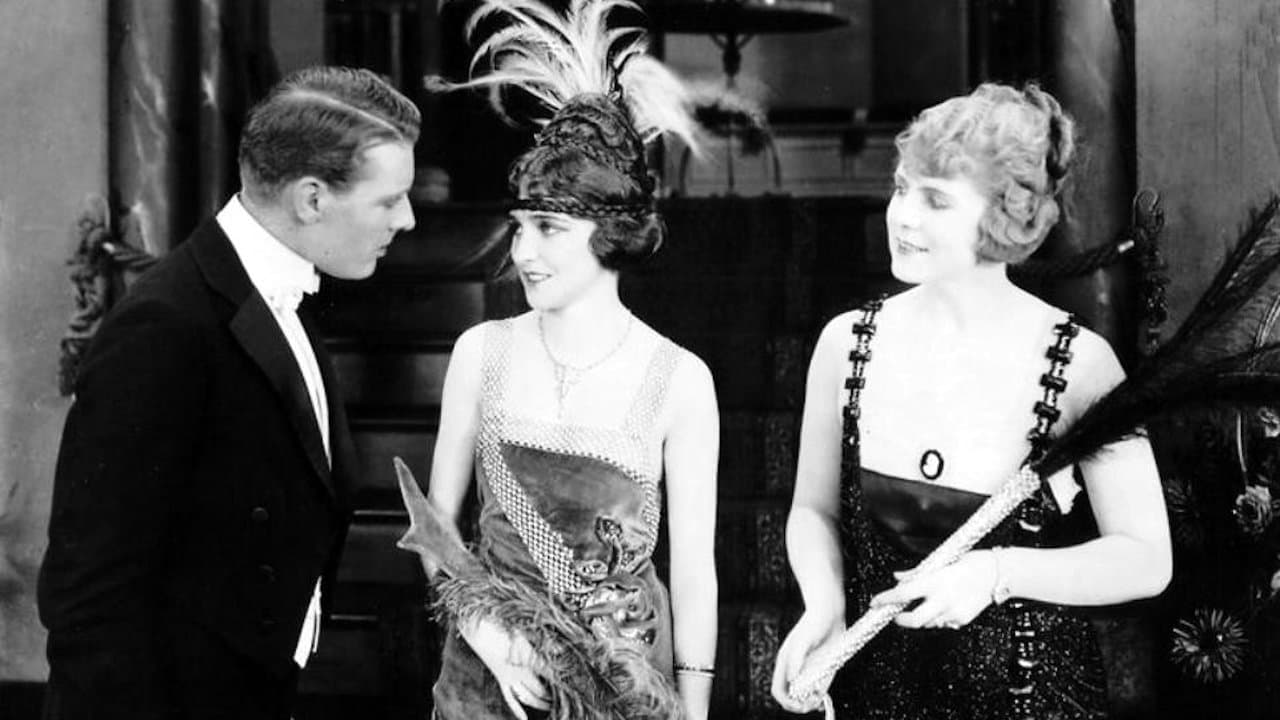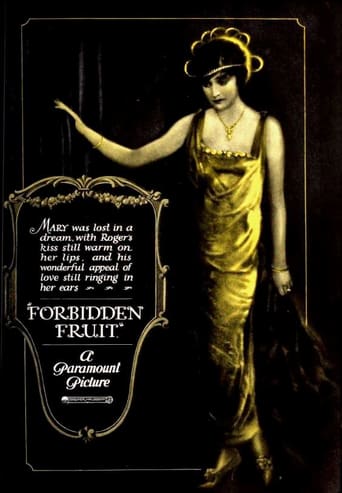



Gripping story with well-crafted characters
Good movie, but best of all time? Hardly . . .
This movie feels like it was made purely to piss off people who want good shows
View MoreThere is, somehow, an interesting story here, as well as some good acting. There are also some good scenes
View MoreForrest Stanley is in a hurry to get out west, but Theodore Roberts wants him to stick around to make a deal, so wife Kathlyn Williams promises him "the prettiest girl in New York" as his dinner companion. When the guest begs off, she substitutes seamstress Agnes Ayres, and they fall in love. Miss Ayres, however, has a failure of a husband who hears about a girl at the Roberts' house with some fabulous jewels he can steal....FORBIDDEN FRUIT is a remake of DeMille's stunning THE GOLDEN CHANCE, with a lot of the absolute degradation ofthe original version missing -- while in the earlier period, DeMille was occasionally interested in showing the audience the dirt and despair of poverty, here it is attributed to greed and laziness on the part of Agnes Ayres' husband, Clarence Burton, and Theodore Kosloff's butler, who had served many of the best families in New York and two years in Sing-Sing. Yet there is a careless greed among the wealthy: Theodore Roberts, who is only interested in keeping Forrest Stanley around so he can make a business deal, regardless of the truth, and Kathlyn Williams, who really doesn't care a fig for anyone or anything except that Miss Ayres doesn't leave with her jewels. Only Mr. Stanley and Miss Ayres seem touched by any emotion but greed, and this makes this, in many ways, a fairy tale. The sequences in which we see Miss Ayres as Cinderella and Mr. Stanley as Prince Charming seem not to be commentaries on the main body of the movie. If anything, the reverse is true, and the movie seems more an exegesis of the fairy tale for the modern (1921) audience.The print on Youtube was in glorious condition, with many sections not only tinted, but toned, lending a sumptuous visual element quite alien to the modern view of silent movies. DeMille's movies were Famous Players-Lasky's (later Paramount) prestige movies, and they spared no expense in their presentation. DeMille made an effort to save his early films, and this is a very good one from this period.
View MoreCecil B. DeMille is in good form in this drama centering on a poor seamstress (Agnes Ayres) who gets caught up in a web of deceit and murder when she accepts an invitation by a social climber (Kathlyn Williams) to fill out her dinner table by posing as Natalie Webb. The scheme is to fill the table with pretty young women to stall a potential business partner (Forrest Stanley) from leaving town before he can invest in the husband's (Theodore Roberts) oil venture.But Ayres is married to a shiftless lout (Clarence Burton) and is therefore "forbidden fruit," as she tells Stanley when he becomes infatuated with her. In a subplot, the butler (Theodore Kosloff) has hidden is jail record and is planning to rob the family jewels.After a domestic squabble, Ayres decides to accept an invitation for the weekend to see Stanley. Meanwhile, Kosloff and Burton team up to rob the jewels, but they get caught in the act and Ayres is exposed as a fraud.Good story and all the actors are good. But the sets and costumes almost overwhelm the actors, especially with the beautiful gold tint. DeMille was famous for his attention to interior design and fashion, and here is an eye-popping example. Not only do we see the little seamstress transformed into a gowned and bejeweled beauty, but we also see her in a few "Cinderella" fantasies that are even more over the top in fashion design.Ayres is quite good as the seamstress but she lacks the hauteur Gloria Swanson brought to these DeMille heroines. All the other actors are solid. Co-stars include Julia Faye and Lillian Leighton as house maids and Margaret Loomis and Conrad Nagel as the actors in the play called "Forbidden Fruit."
View MoreApart from admiring DeMille's attention to detail in this film, I felt absolutely nothing. He can't tell a story because he doesn't engage with his actors. He just hands them a script, expects them to know what they're doing, and then collaborates with the cinematographer. He is a painter rather than a director.
View More